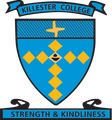Wellbeing

Dear Parents and Friends,
As we enter into the second school shutdown under Stage 4 restrictions the importance of the wellbeing of our young women and families has guided so many of our decisions relating to support for our school community. We have the experience of the first shutdown to “tweak” the remote learning experience and we have consulted with our young women as to how best support them during this second shutdown.
Feedback from our students showed that good sleep patterns were a concern. Regularity and routine are the agents of sleep. It takes discipline to adhere to and commitment to making sleep a high priority. Helping our young women understand how their body clock works, assisting them to work out their optimal bedtime and putting lifestyle habits in place can help them get the sleep they need to maximise their learning, wellbeing, development and overall performance.
Here are some tips to help:
Understand the body clock
Sleep is regulated by a 24-hour body clock that manages the secretion of melatonin to send us to sleep and cortisol to wake us up. This amazing body clock is reset every day when light first hits our retinas. Sleep in late and the clock goes out of synch. When your daughter works with the rhythms of their body’s 24-hour clock they will give themselves the optimal chance for sleep success.
The sleep-wake cycle for teenagers is delayed by up to two hours. That is, they are sleepy later and awake later than when they were children. Melatonin, which makes them sleepy, is secreted as late as 11.00pm for some young people, which makes the time before bedtime a sleepless zone. Cortisol, the chemical that wakes them up is released at close to 8.00am for many teens. If this is the case, your young person’s brain wants to be asleep when they need to be awake for school.
Stick to sleep recommendations
The recommended sleep time for teenagers is 8-10 hours. As every young person is different, you may notice that your daughter needs more or less sleep than is recommended.
Develop good sleep hygiene habits
- Eat and exercise at the right time. Sleep likes a relaxed body and a calm nervous system, so schedule exercise and active movement before mealtimes.
- Create a sleep sanctuary. Restrict bedrooms to sleep and relaxation quarters and find other places in the house for time out and reflection, schoolwork and exercise.
- Keep bedrooms cave-like. Your daughter’s bedroom should be cave-like – that is, dark, cool and free from electronic devices. Darkness encourages melatonin, which regulates sleep-wake patterns.
- Get up at a regular time. For optimal sleep, bed and wake up times need to be as regular as possible.
Lifestyle habits that promote sleep
- Encourage your daughter to put away digital devices at least ninety minutes before bedtime. The proliferation of mobile phones and tablets means teenagers feel like they need to be in touch all the time, but they also need to understand that ‘switching off’ and indulging in quiet time is really important and actually quite normal.
- Minimise weekend sleep-ins and limit them to an hour more than usual, to keep the sleep clock operating on a regular basis.
- Encourage your daughter to go outside every day – take a walk, meet a mate (subject to COVID restrictions) or do an errand.
- Keep homework out of bedrooms, or at least out of beds. The brain associates activity with location, so if your daughter works while on their bed, it will be hard for them to mentally switch off from their schoolwork when the light finally goes out.
- Confine caffeine to mornings. Consuming caffeine in any form close to bedtime is like throwing a wrecking ball through regular sleep patterns. The brain needs to calm down rather than be artificially stimulated if sleep is to occur.
Sleep is a critical component of enhancing a young person’s wellbeing, learning, development and overall performance. Helping your daughter to get enough quality sleep will ensure that their brain and body are being used at full capacity.
At any time during this six-week school shutdown, if you have any concerns regarding your daughter’s wellbeing please don’t hesitate to contact your daughter’s Homeroom Teacher of Student Development Leader via email. All Killester staff are working from home and continue to be available to offer support to our students and families.
Stay safe and well
Regards
Luana Doko
Student Wellbeing Leader
Supporting your Daughter during Covid-19 and Beyond
Smiling Minds have released Care Packs to provide tips and guidance on how to build positive mental health in students. They offer a range of simple, evidence-based activities that can be used to provide immediate relief against worry and anxiety, and used to support a proactive positive mental health approach. Although targeted at 5-12 year olds, these resources could be beneficial for all our students.
We encourage you and your daughter to engage in these activities… her Wellbeing will be better off because of it!
Please follow this link: https://www.smilingmind.com.au/kids-care-packs
Smiling Minds also offers some great mindfulness/ mental health activities to support all individuals.
Do yourself a favour and explore their website:
https://www.smilingmind.com.au/thrive-inside
